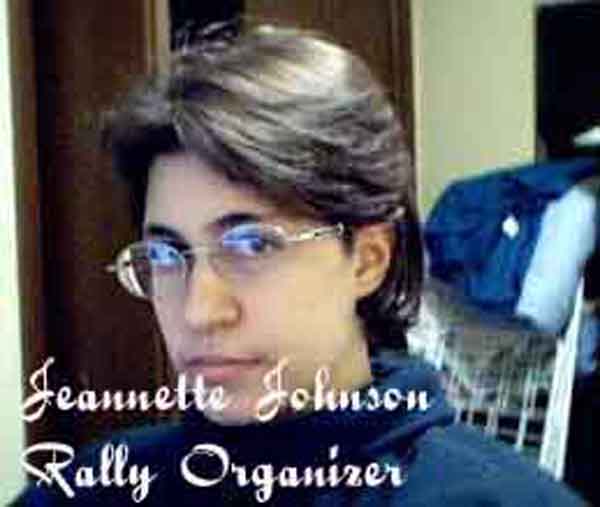2002 Grand Rapids Cochlear Implant CaseOctober 4, 2002 |
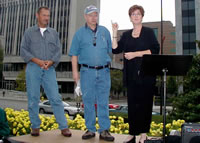
|
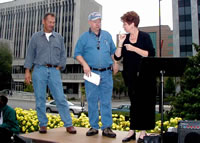
|
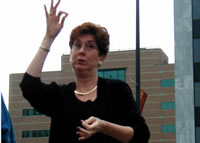
|
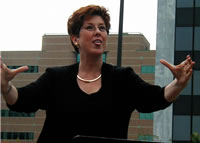
|
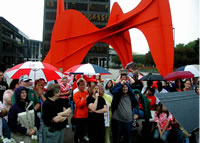
|
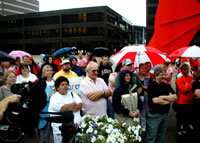
|
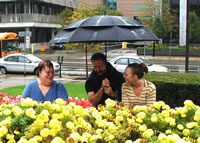
|
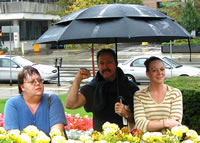
|
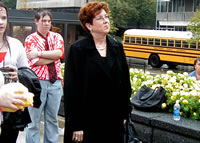
|
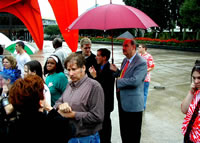
|
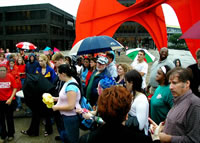
|
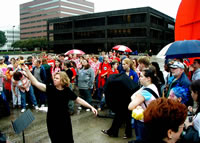
|
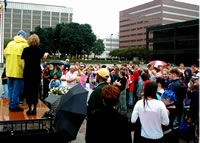
|
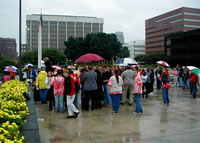
|
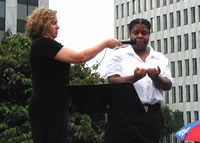
|
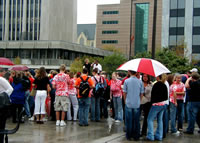
|
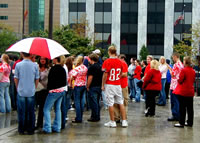
|
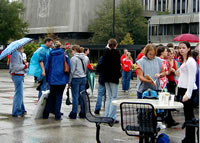
|
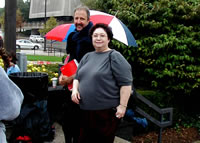
|
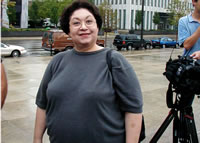
|
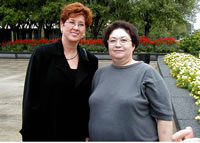
|
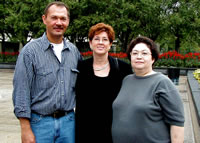
|
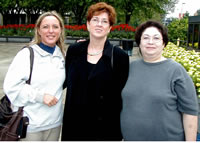
|
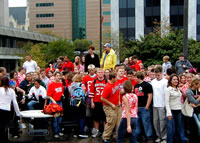
|
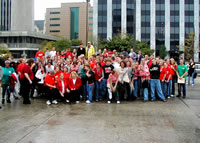
|
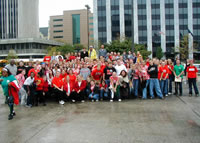
|
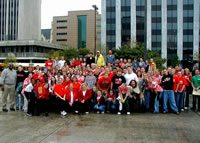
|
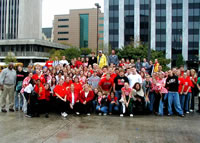
|

|
|
Ladies and Gentlemen, We have entered a new millennium. We have made great strides in advancing the rights of human beings. Society has evolved based on the population’s morals and values, and we have established laws to reflect that. Yet, we are here today to protest a grave injustice. The court is being asked to order two Deaf children to undergo elective surgery without the consent of their Deaf parents. The medical establishment has continually told us that being Deaf is a tragedy. It refuses to admit that American Sign Language is wholly sufficient to allow the development of the language center of a deaf child’s brain and to allow the deaf child to develop full linguistic and cognitive competence, given each individual’s potential. It refuses to admit that there are viable options other than a cochlear implant. Hearing educators, arrogant in their assumptions and who often work in concert with the medical establishment, have integrated Deaf people into hearing classes. Many Deaf students go through school without a bilingual education, therefore forcing them into a system about which they are unaware. Through social promotion, they are advanced on the basis of a lower standard than that in place for general education students. The social service agencies that exist to serve us, have taken it upon themselves to declare what is the best for us, without our consent. They have put blind faith in the educational and medical establishments that profit from the deaf’s lack of education. We are not here just as Deaf persons, or hearing persons, or even as Americans. We are here together as human beings who value a democratic and free society, shoulder to shoulder, and peacefully saying, “We, the people, will no longer tolerate this cycle of injustice.” |
Third Press Release (Summary of the Issues)A News Release from DEAF C.A.N.! Contact: Claudia Lee COURT TO MAKE ELECTIVE SURGERY DECISION-DEAF MOM REFUSES COCHLEAR IMPLANTS FOR TWO DEAF SONS IN GRAND RAPIDS, MI Judge Kathleen Feeney of the Family Division of the 17th Circuit Court is being asked to order that two deaf children get cochlear implants. The deaf parents of these deaf children refuse to give consent for the cochlear implant surgery. These children are now in foster care for reasons not related to the cochlear implant issue. Their parental rights are NOT terminated. It has been reported in the courtroom on September 5 , 2002, that the mother is making progress to have her full custody restored. Because the deaf parents refuse to have the children implanted, it was stated in court that the contracted foster care agency asked the court to order it to be done. The foster care agency now has withdrawn from the case, but the judge has allowed the assistant prosecutor and the guardian ad litem for the children to continue to pursue this case. Individuals from the Deaf Community and the disability community in general are organizing a protest rally for October 4, 2002. The reasons for the protest rally are: · This is a parental rights issue. All parents have the right to make decisions regarding elective surgery for their children, without government interference, even while the children are in foster care, when their parental rights have NOT been terminated. · Inaccuracies must be corrected. The language center of a deaf child's brain does not require a cochlear implant to develop. A "parent's choice" to use of American Sign Language is wholly sufficient to allow the language center of a deaf child's brain to develop and to allow the deaf child to develop full linguistic and cognitive competence, given each individual's potential. It is up to the parents to make these educational decisions. · This is a civil rights issue. Persons who have a disability should not have to justify to a Court their reasons for or against elective surgery, until the population at large is required to do so. · Deaf persons must not be portrayed as "broken". If they elect not to be "fixed" as determined by society, when electing not to have a surgical implant, this choice should be respected. This is an insult to all deaf persons, especially those who are happy and successful without implantation. · It is unacceptable to disassociate Deaf Culture from the concept of Multi-culturalism. Deaf Culture is a minority culture and the rights of deaf individuals to make choices for themselves and their child(ren) should be respected just as other ethnic Cultures are respected in our democracy. · The implied disparagement of Deaf Culture inherent in the prosecution's and the guardian ad litem's case in order to violate parental rights should neither be overlooked nor tolerated. · Cochlear implants should not be viewed as a miracle "cure." Cochlear implant surgeries do not have a uniform effect on all persons receiving them. It is the right of parents to make the informed decision whether or not their child(ren) should undergo elective cochlear implant surgery. · Each person has the right and the obligation to weigh the risks and benefits of a cochlear implant for themselves or their minor child(ren) and be respected for the choice he/she makes. The protest rally will be held at Calder Plaza, 300 Ottawa Avenue, NE, in downtown in Grand Rapids, Michigan, from 8 a.m. to 4 p.m. The primary organizers of this protest rally are Jeannette Johnson, a psychology major at Rochester Institute of Technology and Claudia Lee, an interpreter and an advocate with Deaf C.A.N., of Sylvan Lake, MI. |
Final Press Release (Summary of Events) Due to a team effort by attorneys, members of the Deaf Community and the general disability community, Judge Kathleen Feeney of the Family Division of the 17th Circuit Court of Kent County, in Grand Rapids, Michigan, found that the Court did not have jurisdiction to order cochlear implants for two Deaf children whose Deaf parents opposed the surgical procedure. Judge Feeney found that cochlear implants are elective surgery, and that the children's hearing loss and current level of development does not constitute a medical emergency, contrary to the claims of Kent County assistant prosecutor Kevin Bramble, and the children's attorney-guardian ad litem, Joseph Tevlin. The parental rights issue in this case, as deliniated under Michigan law, proved to the the controlling factor in Judge Feeney's decision. At the outset of the final hearing session of October 4, 2002, Judge Feeney stated that the large number of people in the audience was unexpected, and resulted in the need to set up an overflow room with a live video feed. The Court had not arranged for interpreters for the deaf to provide reasonable accommodation for the many deaf and hard of hearing persons in the audience, or for those in the overflow room. Interpreters had been arranged by the Court, only for the deaf parents, although those interpreters were able to be seen by most of the courtroom audience most of the time. Celeste Johnson, Barbara Hinson, Jeff Oliaz, and Lois VanBroekhoven (interpreter coordinator with DEAF Etc.), who are qualified, professional interpreters, were in the courtroom audience, and stepped in to interpret for the deaf audience members in the overflow room. The Michigan Deaf Association collected donations from across the nation to pay the expenses necessary to bring to Grand Rapids Dr. Robert Hoffmeister of Boston University, chief witness for the defense, so that he could testify in person. Initially offended, once interpreters from the audience took the initiative to make the testimony accessible to them, many Deaf persons found it to be an advantage to be in the overflow room, where they were not subject to the rules of courtroom decorum. Unfettered, they waved and cheered when Dr. Hoffmeister's testimony struck a chord with them, and expressed their feelings when Mr. Bramble or Mr. Tevlin made statements they found offensive. Public awareness of this case appeared to have had an impact on the Court's decision. Jeannette Johnson, a Deaf student at the Rochester (New York) Institute of Technology, led a movement within the Deaf Community to organize a rally to demonstrate the depth of the Deaf Community's and the Disability Community's concerns about this case. More than 200 people were undeterred by the rain, and attended the rally and at least some of the hearing proceedings. Ms. Johnson also established an email list on the internet, that proved to be central to the organization and dissemination of information about the case and the rally. Information about this case was also disseminated via other listserves, including USA-L News (http://groups.yahoo.com/group/USA-L_News), owned by Phil Moos, providing information to the Deaf Community and parents' rights supporters around the world. Ralliers extended thanks to the executive director, Marcy Colton, and board members of Deaf Community Advocacy Network, DEAF C.A.N.!, whose staff was able to assist in the dissemination of information about the case to concerned organizations and individuals, and who also alerted the media of developments as they occurred. National and local media covered the courtoom proceedings. The local media also did interviews with persons interested in and involved in the case. Hundreds of e-mails and letters had been sent to Judge Feeney from Deaf, hard of hearing, and hearing individuals from around the world, notably from the US, Canada, UK, New Zealand, Germany, and Austria, urging her to consider carefully the parental rights issue which was pivotal in this case. Most letters emphasized the mother's right to make the decision for her children to have or not to have cochlear implant surgeries for her children. The Deaf Community was not divided on the issue of cochlear implants in this case. Both those who have chosen cochlear implants for themselves or their children, and those who not, wrote letters to the Judge expressing their opinion that the decision whether or not to implant the children is not for the court to decide, and urging her to allow the parents to decide. Those who wrote letters and sent e-mails to Judge Feeney received responses from her staff stating that she could not read them due to the ex-parte nature of such communication. Many of those who sent such emails and letters, and who attended the rally and court session expressed a belief that their messages did have an impact on the outcome of the case. Many also felt that the obvious presence and mind-set of the Deaf Community, evident in the letters, the courtroom and overflow room attendence, and the rally, were things the Court could not ignore. When delivering her decision, Judge Feeney mentioned that she had noted the efforts of the Deaf Community and their supporters. From the 10th floor of the Courthouse, where Judge Feeney's courtroom and chambers are, there is a clear view of Calder Plaza, where the rally occurred. Many opined that the rally, carrying on in the driving rain, had an unmistakable impact, particularly the speeches and swelled crowd during the lunch recess. Speakers at the rally included Nancy Bloch, executive director of the National Association of the Deaf, Rich Harkleroad, president of the Michigan Deaf Association; Ron Swartz, chairman of the board of Deaf C.A.N!, and others. Jeannette Johnson, prime organizer of the rally, could not attend; but following credits to her from Nancy Bloch and Rich Harkleroad, her mother, Celeste Johnson, delivered her speech to the crowd, that responded to it with cheers and ovations. Those on the upper floors of the Court House could not fail to miss the awesome spectable, even if they couldn't hear it. The Deaf Community also extended their thanks also to the interpreters who volunteered their services at the rally, including Barbara Hinson, Paul Fugate, Claudia Lee (Advocate with DEAF C.A.N.!), and those who accompanied the students from Northview Public Schools. They also acknowledged the efforts of Claudia Koslosky, mother of a Deaf son, who had arranged to borrow the portable stage from Northview Public Schools, the school district that houses the local Total Communication Program for Deaf and Hard of Hearing Students. Despite the rain, Ms. Koslosky, with Bruce Partridge, a long-time ally of the Deaf Community, set up the stage and took it down at the end of the day, making it possible for the speakers to be seen by the crowd. A critical factor in the decision, about which most were unaware, was the amicus brief filed by Attorney Calvin Luker of Oakland County, MI, and Amy Maes, of Michigan Protection and Advocacy Services. Initially, Attorney Luker's wife and assistant, Tricia, worked tirelessly to collect and sythesize information from families of persons with disabilities, to provide Michigan The amicus brief is public record, and may be freely re-distributed. Those concerned about this case have expressed their thanks to Calvin Luker for writing the amicus brief, and to Michigan Protection and Advocacy's executive director, Elmer Cerano (ecerano@mpas.org) and to Amy Maes, Director of Advocacy Services (amaes@mpas.org) for recognizing this case as one with systemic effects for all persons with disabilities in Michigan, and for supporting the brief. Press Release Correction
A quick correction ... I spoke w/Judge Feeney on Monday, September 30th about MPAS filing an amicus brief. Our written motion had requested until October 14th to file the brief itself. Judge Feeney stated she hoped to rule from the bench at the Friday hearing and wanted to reread MPAS' motion before deciding whether to let MPAS appear on the 4th to formally request permission to file the brief. She said she would get back to MPAS or me with an answer. She made no promises, and from my standpoint the question
I just wanted to be sure I corrected this fact. Judge Feeney could have told us "No." Instead she gave us permission, and we were able to perform within the limited time we had. Mark Twain once said "if I'da had longer, I coulda made it shorter." Time did that for us, and in the end it probably was better that we had to cut to the chase without all of the supporting information we were in the process of gathering. The results speak positively for the efforts. Calvin Luke |
Click below to view the Amicus Brief written by Calvin Luker and Amy Maes. |
|
News CoverageAbout the Trial Complete Summary on www.CochlearWar.comhttp://www.cochlearwar.com/newsflash/003a.html
CNN--Wolf Blitzer and Elizabeth Cohen (scroll down transcript to find segment) http://transcripts.cnn.com/TRANSCRIPTS/0210/04/wbr.00.html
|
